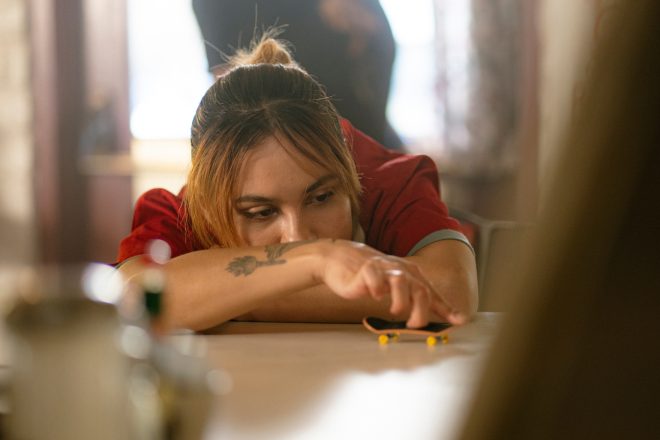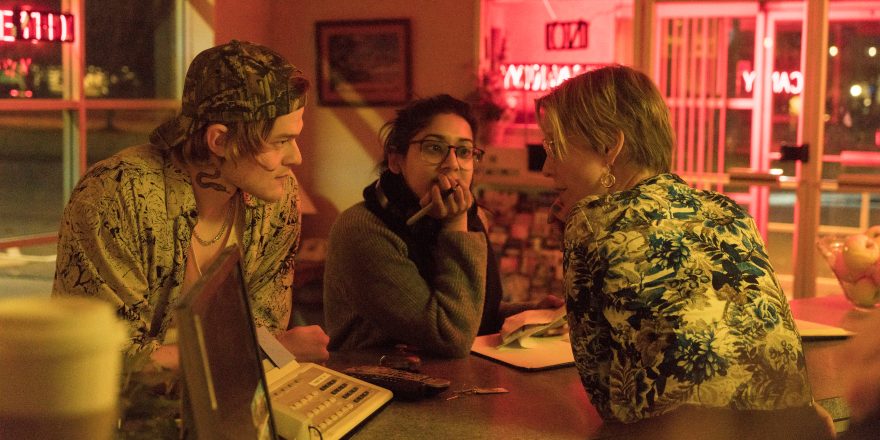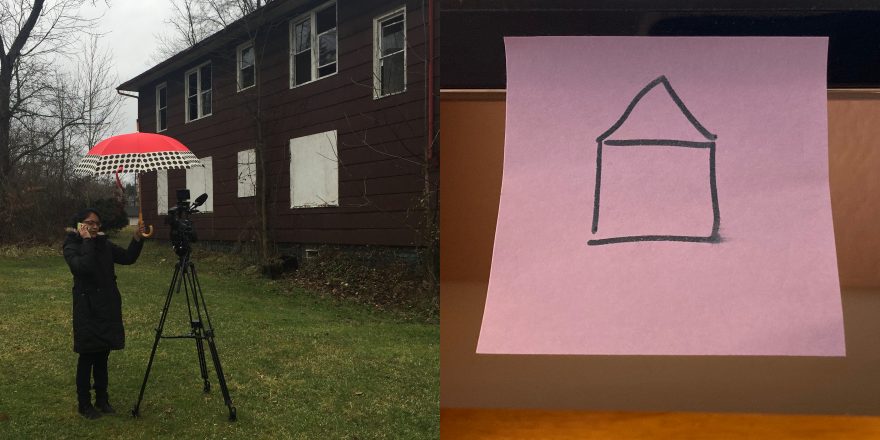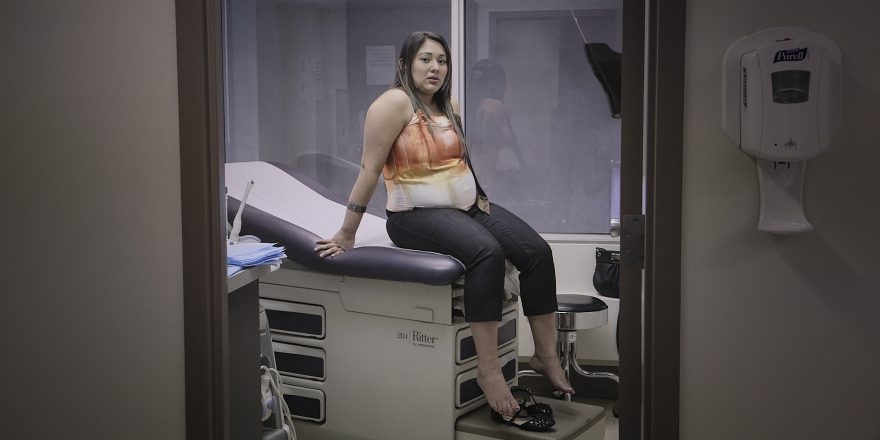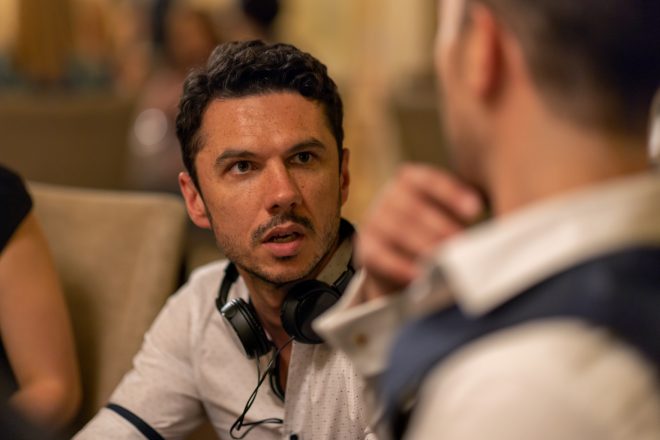I called my mom crying.
It was right before presenting my thesis film – the final step before graduating from a program I had poured four brutal years into. A moment that was supposed to be exciting and celebratory turned into an anxiety attack.
And it wasn’t because I was nervous. It was because I didn’t want to show the film at all.
Because if I did, and no one understood it, then … what was the point of leaving everything behind to get here?
But if I didn’t show it, I wouldn’t graduate.

My film, I Don’t Even Skate, is about a skater, Nahiki, who works under the table. She wants to go to a skateboarding event, but can’t afford the ticket. So, to earn her money, she agrees to do a series of unreasonable tasks. That’s the whole premise. And I knew exactly how it would land with the audience: That’s it?
My school is for privileged kids. The kind of place where the first thing they tell you is, “Don’t get a job while you’re here. This program is too intense.” And yeah, it is intense. But I didn’t have a choice. I worked two jobs the whole time. So when I wrote a story about someone choosing between groceries and a skate event ticket, I wasn’t using a metaphor.
That was my life.
And in that moment, right before the screening, it hit me just how much distance there was between my world and theirs. How could they possibly understand what it means to have a dream, and not just chase it, but to sustain it? To carry your passion in one hand and your survival in the other – and know that, at any moment, you might have to drop one?
But then something happened.

After the screening, a few people came up to me – quiet, honest, a little emotional – and said things like, “I’ve felt that. Not being able to afford what you love.” Or, “I know what it’s like to put something on hold because you have bills to pay.” That’s when I realized: it’s not identity labels that connect us. It’s the raw, aching vulnerability of wanting something more – and not knowing if the world will let you have it.
It made me think about how we romanticize dreams in the U.S. – how much we love the idea of them, and how little we talk about what it actually takes to keep one alive. We say: Follow your passion, work hard, never give up. But the truth is, sometimes the hardest part isn’t the dream itself – it’s everything outside of it. Rent. Time. Money. Visas. And for many of us, that dream doesn’t die dramatically. It dies quietly. Not because we didn’t want it enough, but because we were set up for failure.
There’s a scene in the film where Nahiki has to choose between skipping work to go to the skate park – where her favorite pro skater will be – or staying at work. It’s a small moment, but it holds so much weight. To someone else, it might seem like a no-brainer: just go. But to her – to me – to anyone who’s ever had to hustle just to stay afloat, it’s a devastating choice. If she skips work, she gets fired. If she goes to the park, maybe – just maybe – something changes. It’s a massive gamble.
And then there’s the other layer: immigration.

Because Nahiki works under the table, people assume they know her story: “She’s just another undocumented immigrant.” But we never actually learn that in the film. Maybe she is. Maybe she’s not. Maybe she’s like me – an international student who’s done everything by the book. Ten years in the system. Hundreds of thousands of dollars in tuition and fees. No green card. No permanent residency. No freedom to work legally.
We learned that if we follow the rules, we’ll earn our place. But even when we do everything “right,” we’re still limited. And here’s where that same question comes back again — passion or practicality? What happens when you follow your dream all the way to another country, only to realize the system around you is built to keep you stuck? What happens when you want to build something meaningful, but you’re not even allowed to work – not to survive, let alone to create?
That’s the part people don’t see. It’s not just about chasing a passion.
It’s about fighting for the right to even try.
What kills me is the constant message: “If you don’t like it, you can always go back home.”
I know that. Of course, I know that. As if being here is some casual choice. As if I didn’t leave behind everyone and everything I love to come here. I left because I believed in something bigger. I believed in this dream. I believed in myself. And that belief – that burning hope – is what keeps me here, even when I feel like I don’t belong.
That’s why the pain runs so deep, especially now in Los Angeles. For many people, specifically those who crossed even more dangerous borders than I did, it wasn’t just about personal dreams – it was about survival. About building a better future not just for themselves, but for the generations that come next.
We’ve always done this. We’ve crossed deserts for food. We’ve crossed oceans for resources. Now we cross borders for opportunities. It’s human core impulse to want more, to want better.

That’s why I made I Don’t Even Skate: to leave behind something that felt real – something that could meet people in that quiet ache of wanting more, but constantly being asked to settle for less. It’s for everyone who’s ever watched themselves drift away from the person they dreamed of becoming – not because they lacked drive, but because surviving took up all the space.
Nahiki’s story is personal, but it’s not just mine. It’s the story of anyone who’s had to shrink their dreams to be practical.
But all we are aiming for is the same thing: a chance.
A life where dreaming doesn’t come at the cost of survival. Where passion isn’t a luxury only a few can afford. Whether you were born here or came here later, we all deserve the chance to build something meaningful. And maybe the problem was never us – not our dreams, not our stories, not our accents or bank accounts – but the structures that keep pretending survival is the journey to success.
I still believe in this dream. I have to.
But I’ve learned that the power doesn’t come from just chasing it – it comes from telling the truth about what it costs.
And from choosing, every day, to try anyway.



